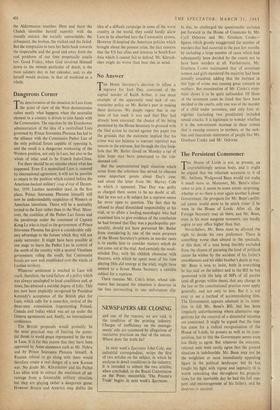No Answer
THE Home Secretary's decision to refuse a reprieve for Jack Day, convicted of the capital murder of Keith Arthur, is one more example of the apparently total lack of any consistent policy on Mr. Butler's part in making these decisions. We deeply regret that in our issue of last week it was said that Day had already been executed; the chance of his being permitted by the Home Secretary to proceed with the libel action he started against this paper (on the grounds that the statement implied that his crime was too heinous to warrant reprieve) was remote in the extreme, but through the tiny loop- hole that Mr. Butler closed on Monday a ray of false hope may have penetrated to the con- demned cell.
But the unprecedented legal situation which arose from the reference has served to obscure some important points about Day's case, and about the letter from Mr. Harvey Cole in which it appeared. That Day was guilty as charged there seems to be no doubt at all; that he was not a fit subject for a reprieve seems far more open to question. The fact that he refused to plead diminished responsibility at his trial, or to allow a leading neurologist who had examined him to give evidence of the conclusion he had formed that Day was a psychopathic per- sonality, should not have prevented Mr. Butler from considering it; one of the main purposes of the Home Secretary's powers in murder cases is to enable him to consider matters which do not come out at the trial. And certainly the weak- minded Day, with his childish obsession with firearms, with which he spent most of his time playing (this did emerge at the trial), might have seemed to a firmer Home Secretary a suitable subject for a reprieve.
There remains Mr. Cole's letter, whose sub- stance has escaped the attention it deserves in the fuss surrounding its one unfortunate slip In this, he challenged the questionable statistics put forward in the House of Commons by Mr. Cyril Osborne and Mr. Gresham Cooke— figures which grossly exaggerated the number of murders that had occurred in the past few months by including a large number of cases which had subsequently been decided by the courts not to have been murders at all. Furthermore, Mr. Gresham Cooke maintained that of seventeen women and girls murdered the majority had been sexually assaulted, adding that the increase in this type of crime was causing great concern to mothers. But examination of Mr. Cooke's state- ment shows it to be quite unfounded. Of those of the seventeen cases he listed that have been decided in the courts, only one was of the murder of a child under seventeen, and only four al- together (including two prostitutes) included sexual attacks. It is legitimate to wonder whether it is the non-existent increase in these crimes that is causing concern to mothers, or the reck- less and inaccurate statements of people like Mr. Gresham Cooke and Mr. Osborne.


































 Previous page
Previous page